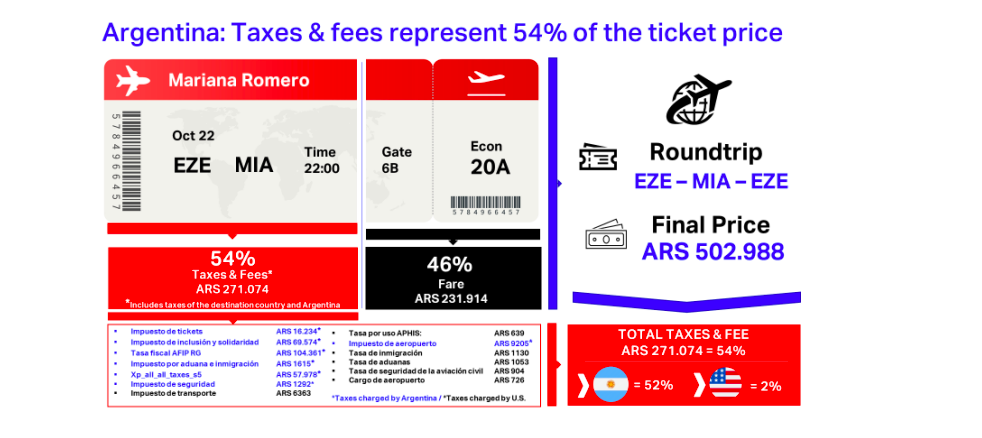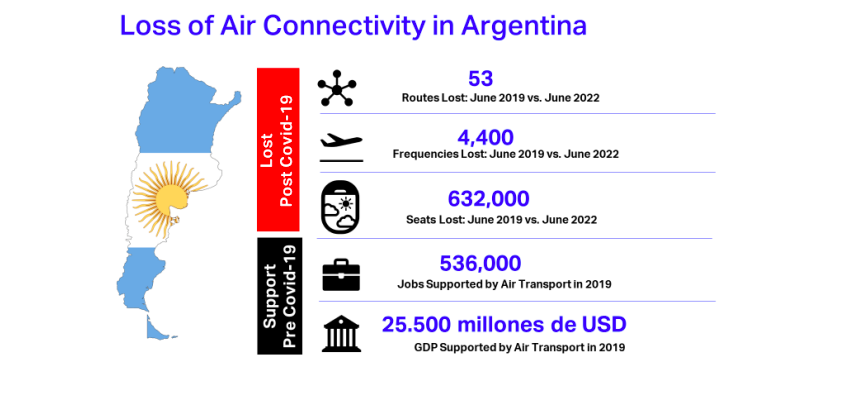The International Air Transport Association (IATA) has voiced its concerns over the creation of a new «security tax» for all domestic, regional, and international flights, which will be used to finance the Airport Security Police (PSA). As recommended by the International Civil Aviation Organization (ICAO), security in civil aviation is a state responsibility and its cost should not be passed onto the passenger.
ANAC, the country’s national civil aviation authority, already charges a security fee of US$ 8 to each passenger. The numerous additional taxes and fees mandated by the local authorities in Argentina make it one the highest taxed countries in the world for passengers and airlines alike. In addition to the ANAC security tax, passengers are charged for the use of airport facilities, immigration, customs, a 7% tourism tax and three additional fiscal taxes of 25%, 30% and 45%. Depending on the base fare, up to 54% of the total value of an air ticket paid by passengers in Argentina in Pesos is composed of taxes.

Airlines operating international services to the country are also faced with higher costs than in most other parts of the continent. For example, air navigation costs in Argentina are eight times higher than in neighboring Chile and landing costs are almost triple compared to Paraguay (based on an Airbus A320- 200 aircraft).
«This recurring policy of taxing the industry is becoming unsustainable. As an industry we have always demonstrated our commitment to collaborate with the government to build a post-pandemic sustainable aviation sector in Argentina. We had forecast that we could reach 2019 traffic levels by 2024, but rather than facilitating this process, the government is just placing more rocks onto an already rocky road. Approving two new taxes in just two weeks is a crippling blow to the industry and to travelers. Argentina is already plagued by unjustifiable taxes and fees that hurt demand for air travel and ultimately inhibit the country’s development,» said Peter Cerdá, IATA’s Regional Vice President for the Americas.
In October, two key industry events were held in Argentina – the annual summit of the Airports Council International Latin America and Caribbean (ACI-LAC) and the Latin American and Caribbean Air Transport Association (ALTA), which brought together government authorities and industry representatives, making clear the sector’s commitment as a strategic partner of this nation. On this occasion, IATA had already expressed its concern regarding the additional 25% tax on international tickets and on credit and debit card purchases made with Argentinian cards outside the country when they exceed US$ 300 per month.
«Argentina has been losing competitiveness compared to its peers in the region. The authorities should consider that. After the end of the summer season in the southern hemisphere, many airlines may reconsider their capacity and frequencies to the country. The decision to add new charges will result in higher costs for the traveler, impacting demand and adversely affecting the development of air transport and tourism industries, which generate thousands of jobs and contribute to the country’s economic growth. It is time for the government and its legislators to recognize the overall socio-economic contribution of aviation and to stop focusing solely on obtaining revenues via taxes and fees,» Cerdá emphasized.

The Argentinian market has the conditions to recover and grow in the coming years, given that its citizens on average only travel 0.61 times per capita per year, which is measurably lower as compared to countries like Chile and Panama. That is why it is necessary to implement other kinds of policies to help more Argentines to travel. «The industry is ready to continue supporting Argentina in its socioeconomic recovery. But we must work together with the government to develop an agenda that will allow the sector to have the capacity to continue growing in a sustainable and efficient way, preserving connectivity and the vital benefits that the industry offers», Cerdá concluded.


